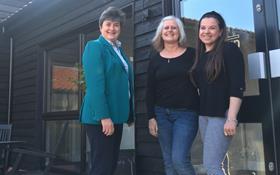
Fresh produce used to be simpler. Before international brands, global supply chains, waste, and even supermarkets, we ate what came out of the ground without much thought. But the realities of a modern market economy have recently dragged (some might say kicking and screaming) agriculture into a 21st century of commodities, consumers and competition.
In this brave new world of year-round produce, a strawberry no longer sells itself like it once did. Furthermore, as the likes of Berry Gardens’ chief executive Jacqui Green says, fresh produce is now in a position to face off against confectionery for market share. Knowing the consumer, or rather understanding the consumer, is a new priority for fresh produce, and England Marketing is throwing itself into this future with gusto. A new research hub recently completed at the firm’s Cambridgeshire site is one of several recent milestones for the market researchers.
“We’re trying to find new ways of establishing why people make the decisions they do and what can influence it, whether at the point of sale, packaging, the quality of the produce, the way it’s displayed in store, and how it’s promoted more widely; we’re just trying to get under the skin of what makes people tick, that’s our point of difference,” says Jan England, founder and chief executive of England Marketing.
“The fact that we have a space where we can try different things out means we have more capacity and scope, and we’re up for partnering with anybody.”
Complete with a large kitchen, a workshop space with one-way mirrors and “sensory booths” that look like voting booths for taste trials, England Marketing is well equipped to explore new frontiers in fresh produce marketing, with the facility described by marketing and PR manager Carolyn Hudson as a “big tool box” for the company.
“It’s increased our capacity and breadth. We can offer clients more of a one-stop shop to really understand what motivates consumers. We can do all the usual things, such as in-store research, or online surveys, but bringing people here to the booths has been surprisingly effective,” England says.
With another 100 taste testers added to its books, England Marketing is also able to expand the width of its research across a more representative range of the British public.
“What nobody really seems to be doing is trying it with ordinary consumers,” England points out. “Instead of having trained tasters saying ‘this has got too much umami or sugar’, we have ordinary people coming in who will be buying it saying ‘I like that one better therefore if that was on the shelves I’d buy it’.”
England Marketing is also enjoying another beginning, by recently partnering up with Anglia Ruskin University to develop a more science-based approach to understanding consumer preferences.
“What people say they do doesn’t always translate to what they actually do. They might say ‘yes I’ll definitely buy a gold kiwi’, because they think that’s what we want to hear; that’s always been the issue with market research,” says England.
She continues: “What we’re trying to do is understand the behaviour, and the psychology a bit more. A few years ago I started looking at biometric testing, so we’ve partnered up with Anglia Ruskin University, and we’ve done one job so far where we’ve used biometric testing, measuring any physiological change in reaction.”
The biometric test works using pads placed on the fingers of participants, which measure their biological responses to sample products, from heart rate to body temperature.
England says the research could open up more effective marketing strategies for fresh produce, with so much still unknown about how consumers make choices in supermarket aisles. “Psychologists say 85 per cent of decision making at the point of sale is subliminal. Shoppers have a preconceived idea about what they are going to buy based on what they had before, what their mum bought, or what their granny bought.
“What we’re trying to do is get a little bit below that 85 per cent, and see if we measure reactions to things can we get that down to 75 per cent, and therefore do we then know how we can influence a bit more at the point of sale?”
While consumer psychology has been an important tool for big corporations, new, cheaper technology is opening up new vistas of exploration for the less budgeted fresh produce sector. “There are hundreds of agencies that do FMCG food and drink, and there a few that do fresh produce, but the difference between us and them is we very much cover the whole supply chain,” England says.
“There’s loads that do consumer research and a handful that do farmer research, but we talk to suppliers and stakeholders up and down the supply chain and cap it with consumer research; it gives us a different perspective.”
Hudson says virtual reality is another emerging tool which England Marketing hopes to explore at the research hub. “We could project onto the walls a virtual supermarket, the possibilities become endless. We’ve aimed to create a blank canvas, so that on it we can create whatever the customer needs.”
With such horizons now opening up to consumer-end fresh produce research, Hudson says England Marketing will “absolutely play a bigger role” in the growth of fresh produce brands, and moreover the way those brands develop and market products.
“I think there has been a lack of excitement about fresh produce, but I think it’s on the turn,” suggests Hudson, with England Marketing primed to help make that turn happen for an industry that is finally awakening to its own vast potential.



